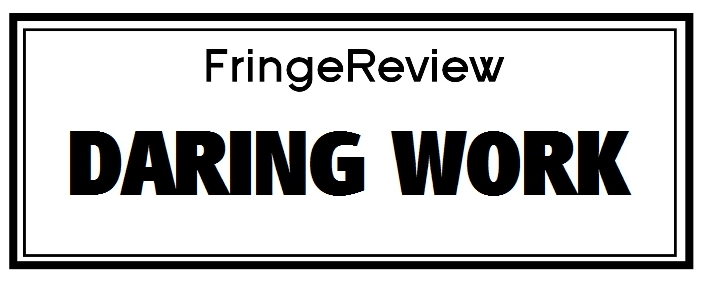Prague Fringe 2024
Alice no
La Petite Mort Teatro

Genre: Solo Performance, Theatre
Venue: The Museum of Alchemists
Festival: Prague Fringe
Low Down
Sofia Pauly’s high-octane and compelling solo act dares to affirm her right to the life she chooses in “Alice no”.
By: La Petite Mort Teatro
Review
The pocket-sized performance space at the Museum of the Alchemists stirs with other-worldly character; much like the popular potion cocktails they serve in the apothecary bar. Naturally, I grabbed my beer and took my seat.
If you had read the description for “Alice no” before the show, you might have known that this show would tackle the all-too-weaponized topic of abortion. That detail had slipped my mind in the blur of the week of Fringe shows and pilsners.
My memory was jogged in the first moments of the opening, staged in jet-black darkness and accompanied by the sounds of two working women babbling. Abrupt and aggressive, a spotlight flashes between the spread legs of our seated main character, Alice, whose hands held in front of her womb are parted open, fingers splayed, and then rapidly contract to fists as we are jerked back to blackout. An impactful half-second cue was enough to signal the procedure. What once existed is no longer.
We meet Alice again as she wakes in the hospital. She’s quirky, positively candid, and a bit off the rails—a side effect of the anaesthesia, her desperation for extra biscuits, or perhaps just her particular flavour of uniqueness. As delightful as she is to observe, the longer her stream of consciousness evades the truth of her situation, the more nervous I get for her.
Fringe audiences are notoriously supportive, generous, and liberally-minded. Regardless, if you exist in a body that can, has, or is expected to become pregnant, you know judgment is inescapable. For me, this was the crux of the building tension. Alice (Sofia Pauly) has all eyes on her behaviour, which is already the quintessential shade of “too much”, and every word will surely be autopsied. However she innately feels post-op will ultimately be up for subjective scrutiny. Alice says quite frankly that she feels “nothing”, and the remainder of the hour is devoted to our discovery of her “why”. As a devised theatre piece, it is stomach-stirring to acknowledge that her character might owe that to the audience.
“Alice no” is a smart and spontaneous script whose structure masterfully navigates an intimate and incredibly individual experience with brevity, wit, and subtextual wisdom. Originally written and performed in Italian, this performance was the English premiere—an outstanding feat by Pauly, whose delivery was fluid, extremely clear, and appropriately emphasised. Additionally, she retains a dramatic Italian flare, a sparky aspect of her performance and character.
Speaking to the production itself, the show is performed with only the bare necessities: a cabaret stool, a small stage, and Sofia Pauly. The direction is specific, defining the space and secondary characters. A special shout-out to the costume designer, for creating a fittingly neutral pinafore frock that triples as a hospital gown, provocative dress, and symbol of youthful vitality.
There is a beautifully crafted moment in the show which begins with her hospital roommate, a young girl who experiences a very different reaction to termination than Alice, and she encourages her to go to a place where she feels most at peace.
The sounds of waves rush in, and the tiny blue lights of the astrological-themed sky in the Alchemist theatre illuminate the room in a deep, twinkly blue. We hear the audio recording of two children playfully conversing in Italian, a memory from a beach of Alice’s childhood.
She smiles. We witness Alice settle into introspective slowness for the first time in the performance. Time seems to stop momentarily as she listens to the children discussing the shapes of the clouds; One cloud looks like a pregnant squirrel (Pauly translates for me in a post-show discussion).
The scene overlaps and Alice is faced with imaginary judgements from her doctor, representing the greater society. It’s powerfully juxtaposed with her free-flowing memory. All the arguments for keeping the baby surface. She’s 35 and in a steady relationship with a supportive partner. She’s got a great job as a children’s book illustrator. She’s a homeowner. She’s capable. It’s time, it’s her responsibility, it’s nature: she should want this.
As the moment builds she admits: she wants to want this, but…
A sudden script is written, and the doctor permits Alice to proceed as she chooses. There is a palpable feeling of relief from her indecision and a validation of her experience.
Just like that, the audience is given the “why” and we understand she feels much more than “nothing”.
“Alice no” is a striking piece of storytelling: daringly self-affirming and unapologetically living in the grey area of a volatile conversation. It’s a piece that leaves us with a profoundly important message: She exists, therefore, she is enough.


















































